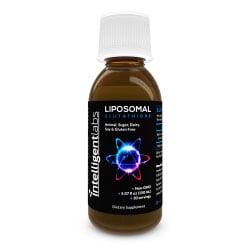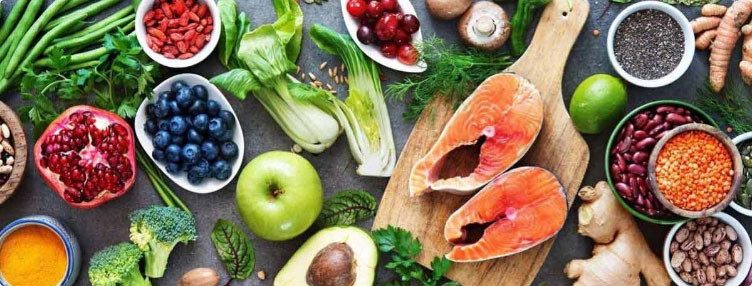Antioxidant Supplements
Have you ever wondered why rust forms on iron or why an apple turns brown when cut and left in the open air? This is due to a process called oxidation. The same process happens within our bodies, leading to what we call oxidative stress.
Oxidative stress is a state that occurs when there is an imbalance between the production of free radicals and the body’s ability to minimize their harmful effects with antioxidants.
Unfortunately, we are constantly exposed to stress and that’s something we can hardly avoid. However, there are still ways to fight this, and with the help of antioxidant supplements, which serve as additional protection, we can shield our bodies against free radicals.
Featured Antioxidant Products

Maintaining good health means ensuring we have plenty of glutathione in our bodies. Liposomal Glutathione is a convenient solution to replenish your glutathione levels, offering an easy and efficient way to maintain your well-being.
from $29.99
Table of Contents
What are Antioxidant Supplements?

Antioxidant supplements are like nature’s power-packed warriors in a bottle. Derived from substances that protect the body against the ravages of ‘free radicals’, these supplements are an essential addition to our daily regimen.
Understanding Oxidative Stress
Free radicals are unstable molecules that can damage cells and contribute to cognitive decline, aging, and diseases.
In simpler terms, imagine your body as a city and free radicals as litter. If too much litter piles up and the city’s cleaning crew (the antioxidants) can’t keep up, the city becomes dirty and doesn’t function well. That’s precisely what happens in our body during oxidative stress – too many free radicals and not enough antioxidants to clean them up can lead to damage and disease.
The Role of Antioxidants in Neutralizing Free Radicals
Antioxidants are like superheroes. They have a unique power and can interact with free radicals and neutralize them. In this way, they prevent these unstable molecules from causing harm to our cells.
In essence, antioxidants help maintain balance in our body, ensuring free radicals don’t get out of hand. It’s like having a personal security team stored inside, working round the clock to keep us healthy.
Natural Sources vs. Supplemental Antioxidants

Food sources like fruits and vegetables or whole grains contain naturally occurring antioxidants. On the other hand, Antioxidant supplements offer a concentrated dose of these powerful compounds, often used to enhance our diets. While both have their place, the debate between natural sources versus supplements continues, with each offering unique benefits to our overall well-being.
Introduction to the Variety of Antioxidant Supplements Available

The world of antioxidant supplements is vast and varied, offering a multitude of options to those seeking to enhance their health. These supplements come in different forms and are derived from various sources, each possessing unique properties to combat oxidative stress in the body. Taking antioxidant supplements can offer many health benefits.
Antioxidants in Our Diet: Fruits, Veggies, and More

When it comes to antioxidants in the realm of fruits, blueberries are the rockstars! And don’t forget about dried fruits – think apples, plums, and apricots. They’re small but mighty when it comes to their antioxidant strength. Other fruit heroes on our list are pink grapefruit, mangos, and those zesty citrus fruits like lemons and oranges.

Switching lanes to the vegetable kingdom, leafy vegetables wear the crown. Spinach, kale, and other green leafy veggies are jam-packed with antioxidants. But let’s not ignore other contenders like beets, broccoli, bell peppers, asparagus, and carrots. Plus, artichokes and beans are also part of the antioxidant club.

And did you know that nuts, seeds, and whole grains are little bundles of antioxidant joy? Take walnuts, for example – they come loaded with antioxidants and might also help keep your waistline in check. Now, that’s a win-win!
Why Consider Antioxidant Supplements?
Calcium is crucial for strong bones and teeth, while iron carries oxygen throughout the body. Magnesium, on the other hand, helps with muscle function and nerve transmission. These are just a few examples of the many essential minerals our bodies need to function properly. It’s important to ensure we’re getting a balanced intake of these minerals through healthy eating and, if necessary, through supplements.
Best Antioxidant Supplements and Their Benefits
Taking antioxidant supplements has become a sort of necessity due to their disease prevention and health benefits. But, with so many products available, it’s tough to make the right decision. Here are a few components you should focus on.

Vitamin C: The Immune System’s Best Friend
Vitamin C supplements are truly one of the best friends your immune system could have. Vitamin C is a powerful antioxidant, defending our cells against free radicals. It stimulates the production of white blood cells and, in that way, strengthens our immune system and fights infections. You can find vitamin C in many plant foods.

Vitamin E: Guarding Cellular Structures
Vitamin E acts as a protective shield against harmful free radicals that can damage our cells which makes it a real champion when it comes to guarding our cellular structures. But that’s not all. Vitamin E supplements also play a crucial role in our immune health. They keep our immune system strong and ready to fight off viruses and bacteria. And when it comes to cellular signaling, Vitamin E is right there in the mix.

Selenium: Trace Mineral with Antioxidant Properties
When it comes to the health of our little ones, we always want the best. That’s why many parents decide to give their kids multivitamin supplements. These multivitamins contain essential nutrients like calcium for strong bones, iron for energy production, and vitamin D for immune support. However, it’s important to remember that these supplements do not replace a balanced diet.

Beta-carotene: The Precursor to Vitamin A
Beta-carotene: the very name might evoke images of bright orange carrots, and rightly so! This vibrant pigment is not just a colorant but a powerful antioxidant in its own right. It’s known as a ‘pro-vitamin A’ carotenoid because our bodies convert it into vitamin A, a crucial nutrient for maintaining good vision, supporting immune function, and promoting healthy skin.
While you can get beta carotene supplements, it’s also abundant in colorful fruits and vegetables. So, the next time you reach for carrots, sweet potatoes, or a slice of cantaloupe, remember that you’re not just enjoying a tasty treat but also fueling your body with this potent precursor to vitamin A.

Lutein and Zeaxanthin: Protectors of the Eyes
The importance of lutein and zeaxanthin extends beyond this protective function. By taking beta carotene supplements, you are supporting the clearance of free radicals in the eyes, which prevents cellular damage. Beta carotene supplementation plays a crucial role in maintaining good vision and reducing the risk of age-related macular degeneration, a condition that can lead to vision loss in older adults.

Coenzyme Q10: Energizing Cells and Combating Aging
Coenzyme Q10 is a powerful antioxidant that combats free radicals and oxidative stress, which are key drivers of cellular aging and damage. By doing so, it helps keep our cells healthy and functioning optimally, contributing to overall well-being and longevity. It also reduces the risk of cardiovascular disease, and some research suggests that coenzyme Q10 can help reduce high blood pressure.

Understanding Polyphenols and Flavonoids
Polyphenols are a category of chemicals that naturally occur in plant foods. They’re known for their disease-fighting capabilities, primarily because they’re rich in antioxidants, which help combat oxidative stress in the body.
Flavonoids, on the other hand, are a subgroup of polyphenols. Our fruits and veggies have vivid color thanks to them, but their benefits extend far beyond aesthetics. Flavonoids possess anti-inflammatory and immune system benefits. Moreover, research suggests they may reduce the risk of heart disease and contribute to cancer prevention.
Health Benefits: The Synergy of Antioxidants
Have you ever considered the synergy of antioxidants? That’s right, when different antioxidants are combined, they can create a health-boosting power team that’s even more effective. This synergy can boost our immune system, slow down aging processes, and even protect against chronic diseases.
Antioxidant Blends and Their Enhanced Efficacy
These blends are a potent mix of various antioxidants found in nature, including vitamins A, C, and E, beta-carotene, selenium, lutein, zeaxanthin, and coenzyme Q10, among others.
When consumed together, they can boost each other’s effects. A classic example is vitamin C, which is known to renew the antioxidant power of vitamin E.
Recommended Dosages and Upper Intake Levels

The recommended dietary allowance (RDA) is 900 mcg for men and 700 mcg for women.
The upper intake level is 3,000 mcg1.

The RDA is 90 mg for men and 75 mg for women.
The upper intake level is 2,000 mg2.

The RDA is 15 mg for adults.
The upper intake level is 1,000 mg3.

The RDA is 55 mcg for adults.
The upper intake level is 400 mcg4.

The RDA is 11 mg for men and 8 mg for women.
The upper intake level is 40 m.
Possible Side Effects and Interactions
Taking vitamin supplements comes with a certain risk. Even though they provide health benefits, high doses of vitamins C and E can lead to stomach cramps, diarrhea, nausea, and bleeding. The same goes for coenzyme Q10, including dizziness and headache. High doses of vitamin A are linked to certain cancers. Some dietary supplements may cause rashes and skin sensitivities.
The Importance of Consulting Healthcare Professionals

According to the national institutes of Health, you should always contact your health care providers in reference to antioxidant supplements. It’s important to remember that supplements are not a substitute for a balanced diet. Healthcare professionals can provide guidance on how to obtain antioxidants primarily from foods and use supplements as an adjunct, not a replacement, to a healthy diet.
FAQ’s
Do antioxidant supplements work?
Yes, antioxidant supplements work because they can provide an extra source of antioxidants for those who may not consume enough through their diet.
Are antioxidant supplements harmful?
Like any other supplement, an antioxidant vitamin can potentially be harmful if not used correctly.
Should men take dietary antioxidant supplements for the prevention of prostate cancer?
The answer to this question isn’t entirely clear-cut, and according to many clinical trials and the national cancer institute, there isn’t enough evidence to definitively say that antioxidant supplements can prevent prostate cancer.
Is it good to take an antioxidant supplement every day?
If your body is exposed to a lot of stress, or you don’t have time to prepare antioxidant rich foods, or you are exposed to pollution, then you are a good candidate for daily antioxidant supplementation.
What is the best antioxidant to take daily?
The best antioxidant supplement is the one that meets your health goals and supports complementary and integrative health. We suggest trying Liposomal Glutathione.
What is the most powerful antioxidant supplement?
Glutathione and astaxanthin are the two most powerful antioxidant supplements.
Is it better to take antioxidant supplements on an empty stomach or with food?
It depends on the type of supplement you consume. It’s best to follow the instructions given on the supplement package or consult a healthcare provider for reduced risk of side effects.
Can children and pregnant or breastfeeding women take antioxidant supplements?
Yes, children and pregnant or breastfeeding women can take antioxidant supplements, but it’s crucial to do so under the guidance of a healthcare professional.
